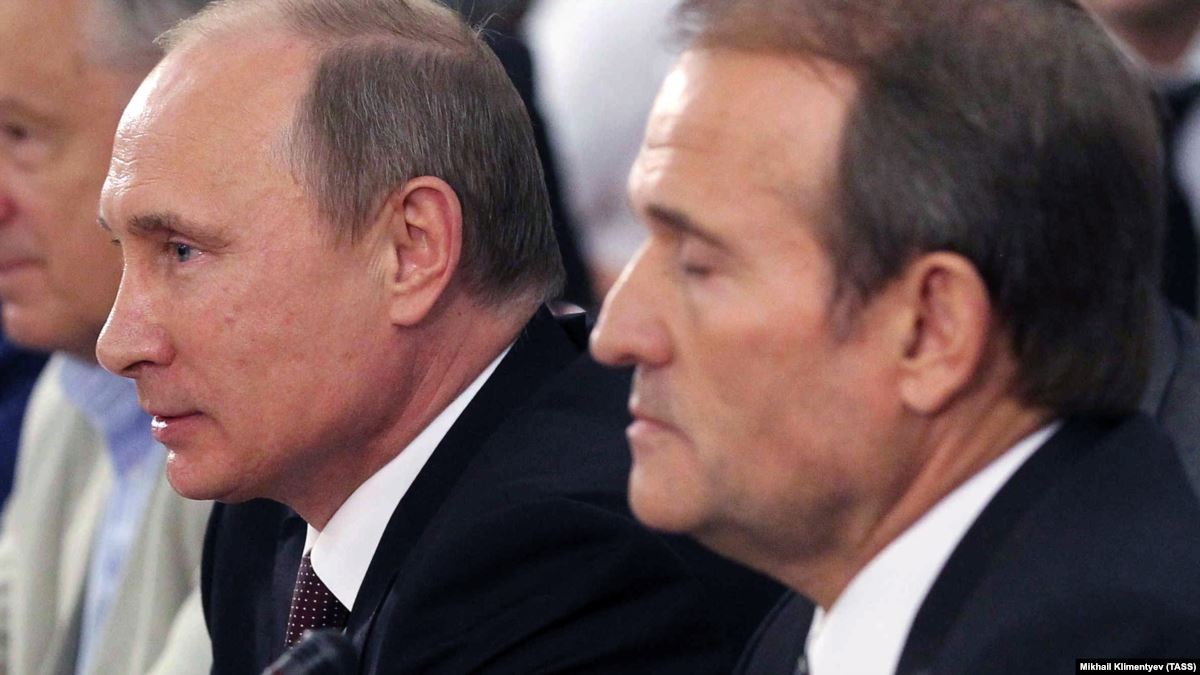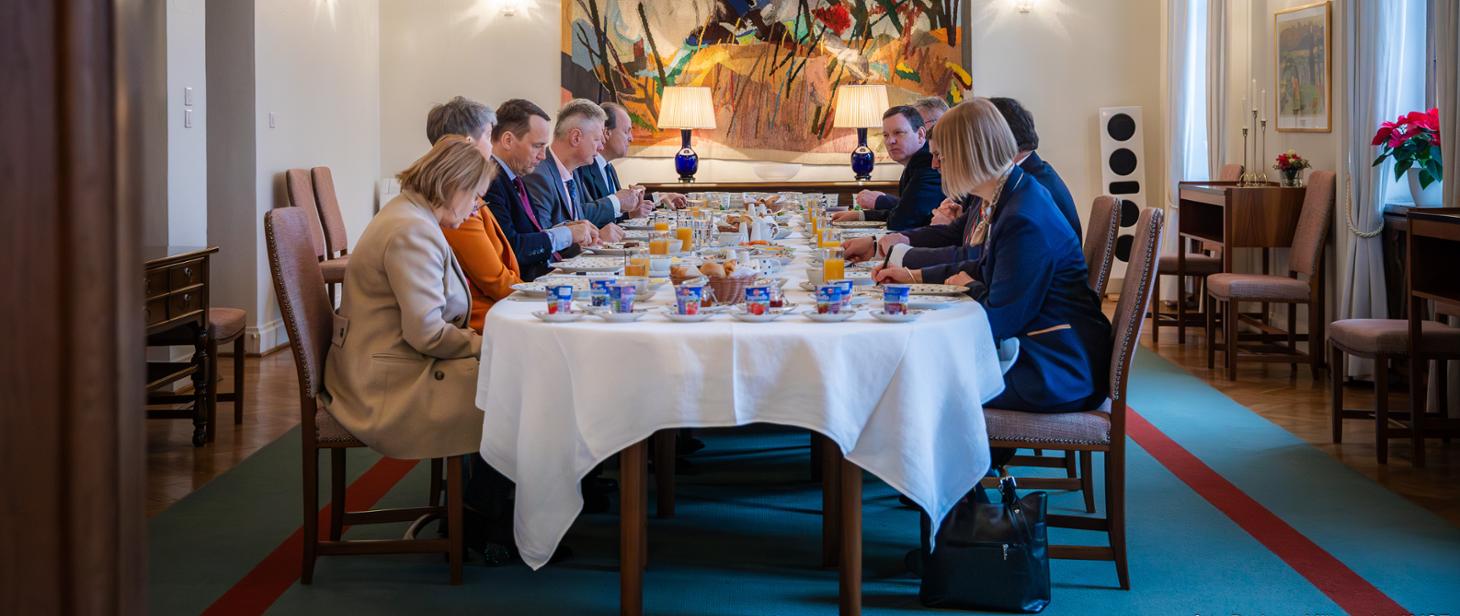
Ukraine’s President Zelenskyy Turns Blind Eye to Putin-Medvedchuk Scheming (Part Two)
Ukraine’s President Zelenskyy Turns Blind Eye to Putin-Medvedchuk Scheming (Part Two)
*To read Part One, please click here.
Viktor Medvedchuk’s party, Opposition Platform–For Life (OP-FL), holds 44 seats in Ukraine’s 450-seat parliament. Despite its limited support, it is the single-largest opposition party, and the only outspoken pro-Russia fraction in the Ukrainian parliament since the July 2019 elections. In November 2019, OP-FL and a small number of like-minded Ukrainian deputies created a cross-party group, titled “inter-parliamentary dialogue for peace, Ukraine-Russia-Germany-France.” They failed to connect with the December 9 Normandy summit in Paris, however, and are now combining with their Russian friends to target the Normandy summit due in April or May in Berlin. Well ahead of that event, Medvedchuk visited the French and German parliaments in January to present this proposal and seek members interested in his inter-parliamentary project. Credible figures will be hard for Medvedchuk to find.
President Volodymyr Zelenskyy, meanwhile, has retreated from his earlier promise to investigate the covert aspects of Medvedchuk’s connections with Moscow. Last August, for example, Zelenskyy had pledged to “investigate how Medvedchuk’s party is financed. There are big questions as to where they get money for their party, their television channels. We know about cash amounts, and [we know] from which country they receive all this. This will be a very loud scandal and it will end very badly [for them]” (Ukrinform, August 31, 2019).
No investigation has been launched, however. Instead, multiple criminal investigations are ongoing against former president Petro Poroshenko—the Zelenskyy team’s distinctive vendetta. Medvedchuk’s status as Putin’s top local ally apparently grants him immunity from Ukrainian legal action, as long as Zelenskyy appeals to Putin to deliver “peace.” Kozak’s recent appointment as Putin’s top representative has raised the Zelenskyy team’s expectations in this regard.
The ruling team is prepared for “situational” (ad hoc) parliamentary cooperation with OP-FL, if and when the presidential party Servant of the People cannot muster sufficient votes for its initiatives. Thus, Zelenskyy was recently able to remove Prosecutor General Ruslan Riaboshapka thanks to OP-FL’s votes for the presidential party’s motion of no confidence (Ukrinform, March 5). Zelenskyy’s and Medvedchuk’s parties have thereby tested a possible model for ad hoc cooperation.
Changing Ukraine’s constitution and legislation as per the Minsk “accords” would force the presidential party into a combination with the same OP-FL in parliament. Servant of the People, with some 250 seats in the 450-seat chamber, lacks the two-thirds majority for constitutional amendments. It might even fall short of a simple majority through defections over such highly contentious issues. Almost 60 Servant of the People deputies have signed a letter of concern (UNIAN, March 14) regarding Ukrainian Presidential Office head Andriy Yermak’s non-transparent March 11 meeting with the Russian presidential representative for Ukraine issues, Dmitry Kozak (see Part One). The party is subject to fissiparous trends over other issues as well (Ukraiynska Pravda, March 18).
Putin has been using Medvedchuk as part of a cat-and-mouse game with Zelenskyy. To boost Medvedchuk’s political rating, Putin had allowed him to mediate prisoner exchanges, repatriating whole groups of Ukrainian captives. Putin then received Medvedchuk with maximum publicity in Russia on the eve of Ukraine’s July 2019 parliamentary elections. Barely two weeks after that, however, Putin granted President Zelenskyy’s wish to replace Medvedchuk with Yermak for negotiating the release and repatriation of Ukrainian captives from Russia. This helped sustain Zelenskyy’s domestic popularity but also propelled Yermak’s own rise as Zelenskyy’s indispensable fixer. For a while, Putin hinted that he might again entrust Medvedchuk with repatriating Ukrainians from Russian captivity; yet Putin seems content with the current arrangement. Putin granted Zelenskyy this favor during their August 7, 2019, telephone conversation, the same one that triggered a series of unilateral concessions from Zelenskyy and Yermak in the Minsk and Normandy processes (see EDM, August 5, September 10, 12, 24, 25, 26, October 3, December 5, 2019). Drifting from one meeting to the next in those processes, with no clear policy and ever-changing ideas, Zelenskyy’s team seems to have one issue firmly in focus: the humanitarian issue of prisoner exchanges, no substitute for strategy.
The Kremlin continues using Medvedchuk in several roles in this game: First, as a long-time proponent of restructuring Ukraine along federal lines with a weak central government; second, to lead the Russophile parliamentary opposition, potentially a reserve of votes for the governing party in “situational” deals if needed to pass legislation (see above); third, to oversee the media holding that has consolidated Ukraine’s pro-Russia electorate around the OP-FL party.
Medvedchuk is wielding certain scripted talking points to dismiss Zelenskyy’s striving for “peace” with Russia and to pressure him into more concessions. Every time Ukrainian soldiers are killed at the front, Medvedchuk adduces this as evidence that Zelenskyy does not do enough for peace. And when the president raises expectations of progress toward an “end to the war,” Medvedchuk counters that this will remain out of reach unless Ukraine fulfills the political clauses of the Minsk “accords.”
Putin has dealt with five Ukrainian presidents in 20 years, but Medvedchuk is the only Ukrainian politician to have enjoyed Putin’s full confidence this entire time and to have repaid this privilege with seemingly unconditional loyalty. Each of them is, however, an asset of limited value to the other. Given Putin’s low popularity rating in Ukraine, his image transfer to Medvedchuk is confined to core Russophile groups—the political field of the OP-FL party. And given Medvedchuk’s quasi-permanent status as an opposition politician, without an institutional power base or access to state resources, he capitalizes on the well-advertised connection with Putin, leveraging this as a power broker with Ukrainian presidents. At this point, Zelenskyy must choose either “peace” on Russian terms with the help of Medvedchuk’s votes in parliament or, alternatively, make good on his promise to initiate the revision of the unimplementable Minsk “accords.”


